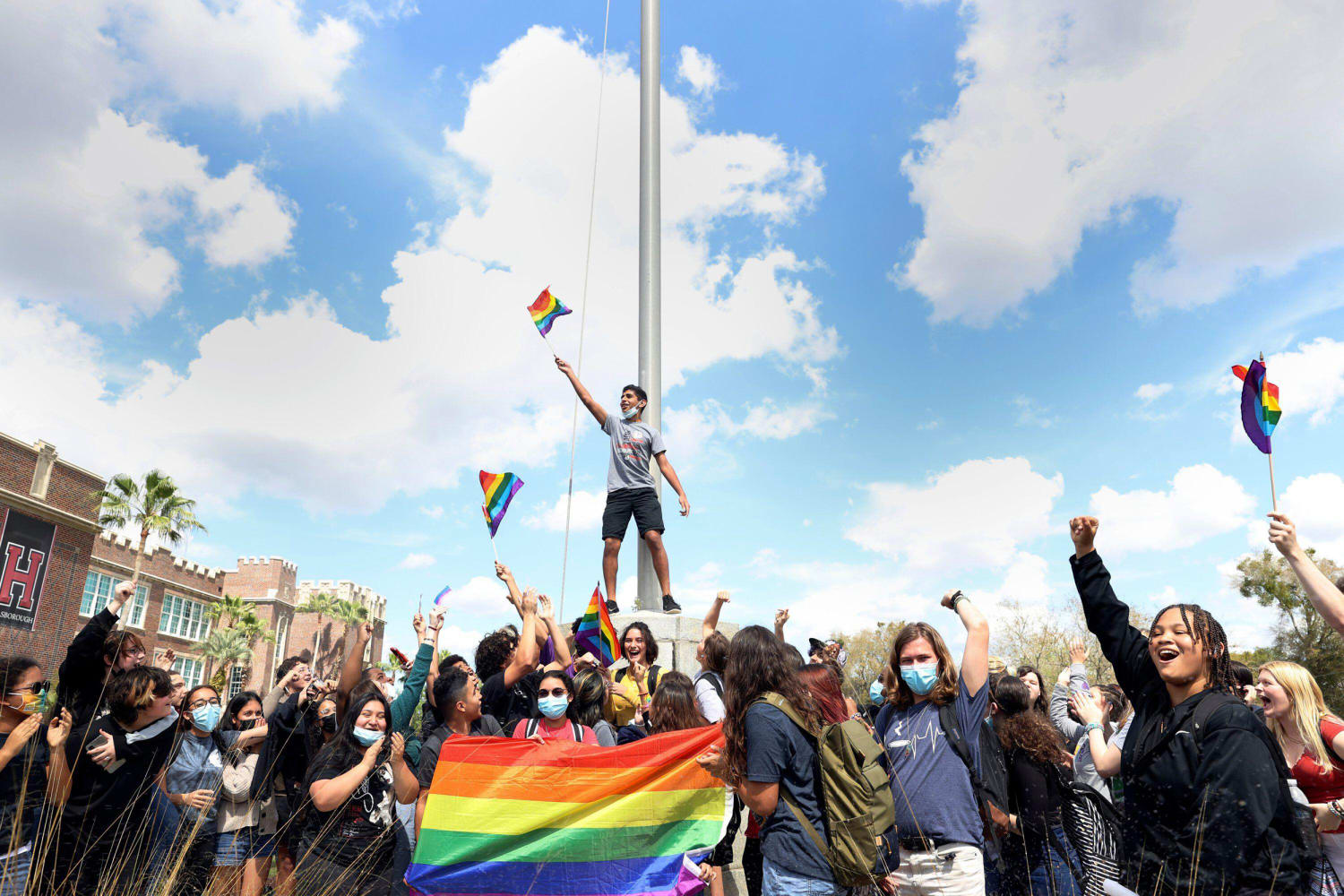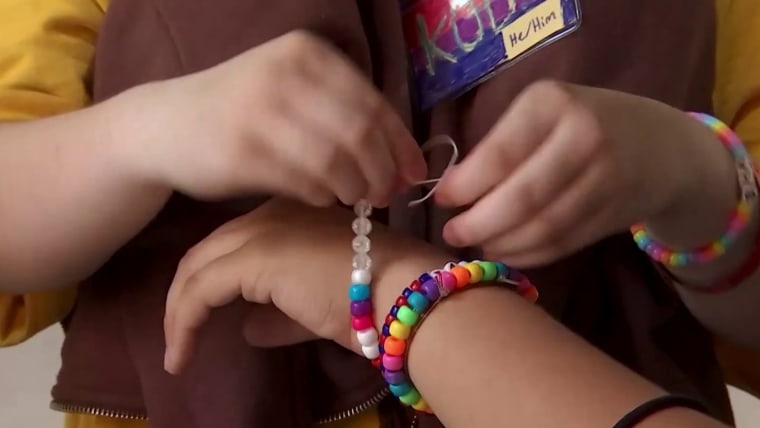When children in Florida return to their elementary classrooms at the start of the school year, they will tell stories about going to camp or taking a summer trip with their families. They may not notice whether a rainbow sticker that was on their old teacher’s door is gone or whether their new teacher doesn’t have any family photos on his desk. But some of these children will be quiet. They will not know whether they, too, can talk about the water park they visited with their fathers or show a picture of the sidewalk chalk art they drew of both their moms.
Many of them will be straight children with queer parents. And the ways anti-LGBTQ laws harm these kids specifically are a gaping hole in our national conversation about the impact of legislation like Florida’s recently implemented Parental Rights in Education law — what critics have called the “Don’t Say Gay” law — which limits discussion of LGBTQ issues in kindergarten through the third grade.
As the daughter of a gay man, I am devastated to imagine what it would have been like to keep my father’s identity a secret at school.
Without a doubt, these laws will harm LGBTQ children and LGBTQ parents. And queer children with queer parents will experience a particular type of double burden. But straight children of LGBTQ parents also face their own challenges. Some are born into queer families and will now attend schools where the family they have always known is put under scrutiny. Others have a parent come out as queer later in life, which was my experience with my father. These kids will have to adjust to their new family make-up in an oppressive educational environment.
Within this diversity of experiences, straight children are often forgotten as adjacent members of the LGBTQ community who are also affected by anti-LGBTQ legislation and rhetoric. That harmful impact starts with the dangerously vague language of these laws. In Florida, for example, legislators have claimed that the measure does not prevent children from speaking about their LGBTQ parents. Still, it enables parents to sue the school district if they suspect that there has been “encouraging” classroom discussion around sexual orientation, which leaves a broad umbrella of concern over facing lawsuits by already underfunded school districts.
Out of fear of retaliation, schools have been responding with a conservative interpretation of the law. This attitude will undoubtedly extend to straight children feeling afraid to talk about their queer families.
As the daughter of a gay man, I am devastated to imagine what it would have been like to keep my father’s identity a secret at school. I was 15 when he came out, and I found invaluable support from my teachers and peers — and not just in a conversational setting. Within classrooms and clubs, I wrote essays, chose monologues and picked research topics connected to my personal experience of having a gay parent.
It is terrible to think that, at any age, children of LGBTQ parents may be unable to integrate their personal experiences into their social and educational community at school, effectively silencing them. And as anti-LGBTQ sentiment grows louder, that silence may make children reluctant to share things about their home life, including any of the common gripes kids have with their parents. School is meant to be a safe space for students to express various feelings and emotions. But now, these laws are telling them that something is “unacceptable” about their families.
The other issue that plays a part in leaving straight children out of the discussion is that while there are many established advocacy groups for LGBTQ children, straight children of gay parents fall into a murky middle area where resources are scarce. COLAGE (formally Children of Lesbians and Gays Everywhere) is the only national organization dedicated to kids with LGBTQ parents, no matter a child’s sexual orientation or gender identity. Otherwise, there are no specific resources for straight children of queer parents who navigate the world with a foot in two different communities. And that can leave them, especially amid widespread anti-LGBTQ rhetoric, to fall through the cracks.
It is especially ironic that straight kids — whom the proponents of these laws seem to care about “protecting” the most — have been put in a position where they are forced to take on the responsibility and concern over how their families are perceived.
In general, straight children of LGBTQ parents also need access to a community, resources and safety to be able to talk about their families without censoring themselves. But the stakes are even higher now, as repressive laws take effect. Children need to be able to speak about their families with love, joy, irritation and concern — no matter what their families look like. “Any problem that can plague a human family of any color, size or nationality can also be a concern in a queer family,” Jordan Budd, executive director of COLAGE, told me. Budd both identifies as queer and is the child of a queer parent.
The harmful claims that these laws protect children and somehow safeguard their innocence actually do the opposite. They foster a culture of secrecy that forces children to mature quickly, burdened by the pressure to be cautious.
“There is a societal pressure to be perfect because you’re so worried about what people think about your parents and their parenting style,” Budd said. That pressure is only intensified in environments that are hostile toward LGBTQ adults.
When the people making decisions about your education refer to LGBTQ adults as “groomers,” children of queer parents understand that this dangerous language also refers to their own parents. This is more than any child should face, but it is especially ironic that straight kids — whom the proponents of these laws seem to care about “protecting” the most — have been put in a position where they are forced to take on the responsibility and concern over how their families are perceived.
The burden to protect their parents from skepticism should never fall on a child, but this type of isolation will be the reality for many youths with queer parents. Straight children, in particular, may feel extra pressure to present their family as “normal,” something I experienced after my father came out. As my family navigated our new dynamic in the area my father had spent his whole life, I wanted to protect him by showing we were just the same as before, rather than celebrating the differences that his identity and queer culture brought into our life.
In the darkest application of this pressure, children may be afraid that others will interpret the actions of their parents, like attending culturally queer drag show events, as grooming or abuse. If states continue their efforts to criminalize aspects of many LGBTQ families’ communities, the fear of others taking their parents’ actions the wrong way may grow into an even scarier reality for children: being removed from the care of their queer families.
All children, regardless of who their parents are, have the same right to safety and stability at school and at home. While LGBTQ children (with or without queer parents) will certainly have those rights infringed upon in a painful, specific way, we need to acknowledge how straight children with queer parents will also face uniquely isolating situations. They also deserve attention, acceptance and a voice.
Source: | This article originally belongs to Nbcnews.com











